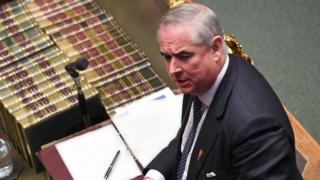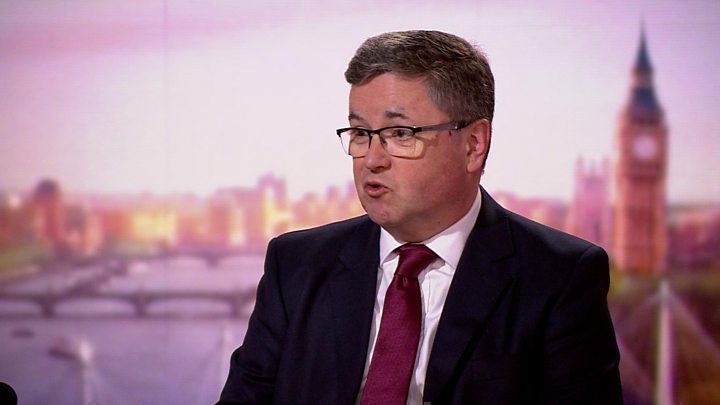Brexit: Geoffrey Cox says PM 'damaging' UK's reputation with bill
 Image copyright UK Parliament/Jessica Taylor
Image copyright UK Parliament/Jessica TaylorFormer attorney general Geoffrey Cox has said he will vote against the government's attempts to override the Brexit Withdrawal Agreement when it comes before the Commons.
He accused Boris Johnson of doing "unconscionable" damage to Britain's international reputation.
The Internal Market Bill would go against the agreement signed by the UK and European Union earlier this year.
Justice Secretary Robert Buckland said the bill was an "insurance policy".
Mr Buckland told the BBC he hoped powers being sought by ministers would never be needed, and that he would resign if the UK ended up breaking international law "in a way I find unacceptable".
Mr Cox backed Brexit and was the government's top legal adviser when the Withdrawal Agreement was drawn up.
Writing in The Times, Mr Cox said there was "no doubt" the "unpalatable" implications of the Withdrawal Agreement were known when the PM signed it.
"We, the British government and parliament, have given our word. Our honour, our credibility, our self-respect and our future influence in the world all rest upon us keeping that word," Mr Cox wrote.
He said that there were lawful ways for the government to deal with its concerns, such as using a procedure set out in the agreement to take "temporary and proportional measures" to protect the UK's interests if approved by the Commons.
"What ministers should not do, however provoked or frustrated they may feel, is to take or use powers permanently and unilaterally to rewrite portions of an agreement into which this country freely entered just a few months ago," he added.
The UK has insisted there must be no new checks on goods moving from Northern Ireland to Great Britain when it leaves the EU's single market and customs union on 1 January.
The Northern Ireland Protocol, a key part of the Withdrawal Agreement signed by both sides last year, is designed to prevent a hard border returning to the island of Ireland.
The Internal Market Bill would give ministers the power to reduce the amount of paperwork that Northern Irish firms have to fill in on goods bound for Great Britain, such as export and exit declarations, or to remove the need for them entirely.
It would also allow the UK to modify or re-interpret "state aid" rules on subsidies for firms in Northern Ireland, in the event of the two sides not agreeing a future trade deal.

It is controversial because it would change the terms of the Northern Ireland Protocol, a crucial part of the legally-binding Withdrawal Agreement agreed by both sides prior to the UK's exit from the EU on 31 January.
The government's intentions have drawn widespread criticism, with former prime ministers Tony Blair and Sir John Major accusing the PM of "embarrassing" the UK.
The former leaders were in office during key periods of the Northern Ireland peace process.
The two urged MPs to reject the "shameful" attempt to override parts of the agreement, writing in the Sunday Times that the government's actions were "irresponsible, wrong in principle and dangerous in practice".
The EU has warned the UK it could face legal action if it does not ditch controversial elements of the Internal Market Bill by the end of the month.
- THE RULE OF SIX: What's in the small print?
- UNWIND WITH THE MINDFUL MIX: Switch off and escape
from Via PakapNews